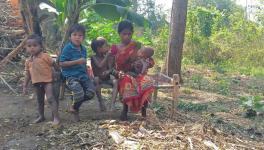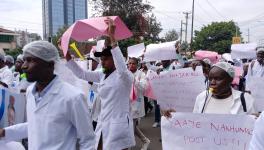TN Elections: Once a Pioneer in Public Healthcare, the State has Taken Wrong Turns Under Palaniswami
Representational use only.
Chennai: For decades, Tamil Nadu was lauded for its public health system. Though it continues to hold a high ranking in the country, the past few years have been detrimental for public healthcare in the state.
The state slipped six places in the health index released by NITI Aayog in 2019.
It may be noted that Tamil Nadu has deviated from a welfare-oriented, pro-people system and is slowly heading toward privatisation of public healthcare.
Two important steps were taken in healthcare since Edappadi K Palaniswami took oath as Chief Minister in 2016 – these are the decision to take a loan from the World Bank in 2019 and launching the mini clinics scheme in December 2020. Experts say that both these programmes are poorly designed, under planned, and are headed towards collapse.
Adding the World Bank funds, the Tamil Nadu budget for healthcare was 22% higher in 2020-21 than the previous year. But, there was 0% change from the revised estimate of 2019-20 budget from that of 2020-21 according to PRS Legislative Research. This shows the government’s disinterest in expanding expenditure on public healthcare.
WORLD BANK FUNDS UNSPENT, BUT PAYING INTEREST?
The AIADMK government borrowed close to Rs. 2,000 crore from the World Bank for launching the Tamil Nadu Health System Reform Programme (TNHSRP) on March 3, 2020. With the addition of state government funds, the total cost of the programme is Rs. 2,857.003 crore.
When the programme was launched, its stated objective was achieving result-oriented outcomes in healthcare delivery over a five-year period. One year later, there is no news about any advances in the programme and where the money has been spent.
The loan was taken with an aim to manage non-communicable diseases (NCD) and injuries and reduce inequities in reproductive and child health services in the state.
Dr T Sundararaman, global coordinator for People’s Health Movement (PHM) told NewsClick: “The money is unspent, but they will be landing up paying interest on it. None of the promises have been implemented. That programme more or less has collapsed.” Regarding the lack of implementation, he said “they will blame it on COVID-19”.
The first case of the COVID-19 pandemic in Tamil Nadu was reported on March 7, 2020, three days after the launch of the programme.
Elaborating on the lack of flexibility in World Bank loans, economist Prof Venkatesh Athreya said: “The most important thing for healthcare is that it should be planned locally and designed locally. But the World Bank designs are top down. If not the local bodies, at least the state government should be involved, based on ground realities. But the World Bank is conditioned by the metric, and the Tamil Nadu government is not interested in involving local bodies and on ground people.”
Athreya said “borrowing money from the World Bank comes with a substantial repayment obligation, pressure would be from both the Bank and the Union government”. Therefore, even if the funds are unused and the programme is not implemented, the state would be pressed to repay the loan with interest.
MINI CLINICS, THE ROAD TO PRIVATISATION
The Amma Mini Clinic scheme was launched with much fanfare in the midst of pandemic in December 2020. It was immediately criticised as an election gimmick, which could threaten the existing public healthcare system.
It is three months since the launch of the scheme, and a doctor working as assistant professor in a government medical college, told NewsClick: “All the noise made during the inauguration of the mini clinics has died down. The burdening of doctors and nurses from other health institutions has hampered the effectiveness of these institutions.”
Doctors also say that the mini clinics are an “inadequate” initiative compared with the need of the hour. Each mini clinic only houses one doctor, one nurse, and one all-purpose hospital worker in a single room. The demand from the health sector was to expand and extend the successful model of Public Health Centres (PHCs).
“Mini clinics are not a proper substitute for health deliverables. It is there for the time being on ad hoc basis. It may not be accommodated into the proper health system. If it continues like this, they may even leave it to the private sector”, said Dr. Rex, President of Tamil Nadu Health Development Association.
Dr. Sundararaman said: “Under-designing and under-planning can often lead to public set-ups collapsing. It may also be a justification for privatisation later on”.
The assistant professor, who did not wish to be named, expressed similar views. “The threat of privatisation of healthcare for the economically and socially backward is real now”, he added.
“The government is only putting on a show and the mini clinics are a token move and an election gimmick” he said. He also elaborated saying “Mini clinics do not provide full healthcare. If a patient comes with a non-communicable disease (NCD), a whole network of referral care is necessary, a link for a wider set-up is needed, which are missing. The government even promised “nalvaazhvu maiyangal” (wellness centres) as part of it, which they have not progressed on”.
It is reported that even the existing wellness clinics have failed to serve their purpose. Inaugurated in November 2016 under the Centrally-sponsored scheme, the clinics have been functioning without doctors, therapeutic assistants and pharmacists. Despite being sanctioned by the AYUSH ministry and approved by the Commissioner of Indian Medicine and Homeopathy, Chennai, vacancies are not being filled and facilities not created. The wellness clinics are supposed to function for six hours a day for six days a week.
HEALTH SYSTEM WAS NOT EQUIPPED FOR PANDEMIC?
During the initial days of the COVID-19 pandemic, Tamil Nadu was criticised for its poor measures to fight the spread of the virus. In the initial days, the government was not even able to track the exact number of people under home and hospital quarantine. For over two months, the state was second in the country in total number of positive cases per day and third in fatality rate.
Tamil Nadu also faced criticism for the low number of tests in the first few months since the outbreak. The first case in the state was found on March 7, 2020 and as of March 16, it had only tested 90 samples while neighbouring Kerala and Karnataka had tested more than 1,500 and 750 samples, where the first cases were found on January 30 and March 6, respectively.
Krishnaswamy, an office bearer of All India People’s Science Network (AIPSN), said: “Testing for the virus could have been much better in Tamil Nadu. Neighbouring Kerala is doing a much better job. TN could have matched Kerala, but it went on with giving ‘kabasura kudineer’ in the initial days, which was only a diversionary tactic.” Kabasura Kudineer is said to be a Siddha concoction that claims to fight diseases.
Krishnaswamy further added: “Vaccination is not happening in rural areas. In the rural areas, 10 to 20 km around Madurai, there is little vaccination happening. After one year of the spread of the virus, the state has not learnt what to do and how to do. It is also not ready for the second wave”.
CORRUPTION
With the outbreak of the pandemic, the state was obliged to make large-scale purchases to fight the pandemic. Many sources had cited heavy corruption through fixing of tenders.
Opposition parties in Tamil Nadu demanded an explanation from the state government for its decision on buying coronavirus rapid test kits at higher price from an intermediary company rather than directly from the importer. The kit are said to be bought for Rs 600 each, instead of Rs 245, including freight charges
An administrative staff in a government medical college alleged that “the problem is, the ruling government is working for their own wants. Even though tenders are floated, the ruling party is directing the purchases to certain parties, who give a cut to them.
The bargain and price is already fixed before tenders are floated. This is the main form of corruption in the system and clearly a form of bribery”.
Get the latest reports & analysis with people's perspective on Protests, movements & deep analytical videos, discussions of the current affairs in your Telegram app. Subscribe to NewsClick's Telegram channel & get Real-Time updates on stories, as they get published on our website.
























